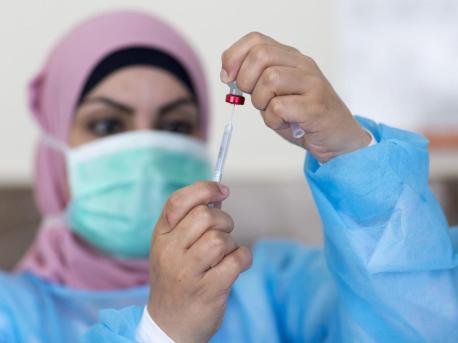
UNICEF Stockpiling 520M Syringes for Global COVID-19 Vaccination
UNICEF is readying more than half a billion single-dose syringes by the end of the year, part of a plan to preposition critical equipment for use as soon as a safe and effective vaccine is available.
It will be the fastest vaccine development and distribution ever. As the world awaits a COVID-19 vaccine, UNICEF has begun laying the groundwork for the rapid, safe and efficient delivery of the eventual vaccine by prepositioning syringes and other critical equipment around the world.
520 million syringes will be prepositioned in UNICEF warehouses by the end of the year
As part of that plan, UNICEF will stockpile 520 million single-dose syringes in its warehouses by the end of the year. Laid end to end, that's enough syringes to wrap around the equator one and a half times.
As soon as COVID-19 vaccines successfully emerge from trials and are licensed and recommended for use, the world will need as many syringes as doses of vaccine. During 2021, assuming there are enough doses of COVID-19 vaccine, UNICEF anticipates delivering more than 1 billion syringes to support COVID-19 vaccination efforts globally, in addition to the 620 million syringes that UNICEF will purchase for other vaccination programs to protect children from measles, typhoid and other vaccine-preventable diseases.
Vaccinating the world against COVID-19 will be one of the largest mass undertakings in human history, and we will need to move as quickly as the vaccines can be produced," said UNICEF Executive Director Henrietta Fore. "In order to move fast later, we must move fast now.
“Vaccinating the world against COVID-19 will be one of the largest mass undertakings in human history, and we will need to move as quickly as the vaccines can be produced,” said Henrietta Fore, UNICEF Executive Director. “In order to move fast later, we must move fast now."
UNICEF is also procuring safe syringe disposal boxes and solar fridges for vaccine storage in countries without reliable electrical power
Besides syringes, UNICEF is also buying 5 million safety boxes for safe disposal of syringes and needles by health workers, mapping out "cold chain" logistics for vaccine delivery with WHO, and procuring solar-powered refrigerators to store vaccines in countries with little access to electrical power.

A solar-powered refrigerator installed at Bethesda Health Center, Cap Haitien, Haiti, October 2020. © UNICEF/UNI350011
Early purchasing saves time and reduces pressure on the market
Vaccines are heat-sensitive and usually shipped by air freight. Injection equipment such as syringes and safety boxes have a shelf life of five years and can be transported by sea, then distributed to countries in advance of vaccine delivery. Early purchasing not only saves time, it also reduces pressure on the market and preempts potential early spikes in demand when vaccines do become available.
In collaboration with PAHO (the Pan American Health Organization), UNICEF is spearheading efforts to procure and supply COVID-19 vaccines as part of the global vaccine plan of the COVID-19 Vaccine Global Access (COVAX) Facility led by Gavi, the Vaccine Alliance. UNICEF is already the world's single largest vaccine buyer, procuring more than 2 billion doses of vaccines every year for routine immunization and outbreak response on behalf of nearly 100 countries.
Every year, UNICEF provides vaccines for almost half of the world's children
Every year, UNICEF provides vaccines for almost half of the world's children. Founded in 1946 to help protect children after World War II, UNICEF has a long history of mobilizing lifesaving supplies for children. With the world's largest humanitarian warehouse in Copenhagen, Denmark, UNICEF's established supply chain network will be invaluable in ensuring the safe and equitable distribution of the eventual vaccine.
“Over two decades, Gavi has helped an additional 822 million children from the world’s most vulnerable countries access critical, lifesaving vaccines,” said Seth Berkley, CEO of Gavi. “This would not have been possible without our partnership with UNICEF, and it is this same collaboration that will be essential to Gavi’s work with the COVAX Facility.”
“We are doing everything we can to deliver these essential supplies efficiently, effectively and at the right temperature, as we already do so well all over the world,” Fore said.
Top photo: On May 3, 2020, nurse Hana Barakat fills a syringe at the Ministry of Health clinic in Ramallah, State of Palestine. © UNICEF/UNI347513/Izhiman
HOW TO HELP
There are many ways to make a difference
War, famine, poverty, natural disasters — threats to the world's children keep coming. But UNICEF won't stop working to keep children healthy and safe.
UNICEF works in over 190 countries and territories — more places than any other children's organization. UNICEF has the world's largest humanitarian warehouse and, when disaster strikes, can get supplies almost anywhere within 72 hours. Constantly innovating, always advocating for a better world for children, UNICEF works to ensure that every child can grow up healthy, educated, protected and respected.
Would you like to help give all children the opportunity to reach their full potential? There are many ways to get involved.





